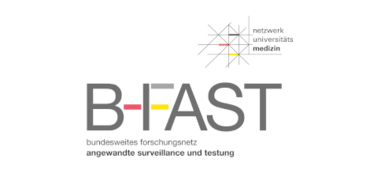B-FAST
Bundesweites Forschungsnetz Angewandte Surveillance und Testung

Develop an integrated testing and surveillance strategy platform for different settings, such as the general population, schools and daycare centers, high-risk areas, and hospitals.
The network's collaborative assessments of testing methods and joint development and evaluation of surveillance approaches will help to develop surveillance and testing strategies that are sustainable, scalable, and transferable to future pandemics.
Which challenge is addressed?
Germany coped relatively well with the first wave of the SARS-CoV-2 pandemic in international comparison. Numerous local testing and surveillance concepts were designed and implemented at short notice. Supraregional coordination of activities is now urgently needed to achieve a common, best science-based and consensus-based strategy for optimal surveillance.
Assessing and ensuring effective but also proportionate interventions is a top priority. In order to control the pandemic in the long term and to manage new pandemics with the least possible socioeconomic impact, achieving the following goals through an optimal testing and surveillance strategy is imperative:
- very early detection of new infections and sources of entry
- as complete as possible detection and follow-up of infectious individuals and contacts
- prompt detection and evaluation of infection chains, identification of unexplained new infections
- Avoidance of nosocomial and occupationally associated infections within the critical infrastructure.
Not only must information be collected as quickly as possible; equally critical is the prompt provision of quality-tested recommendations of strategies to local, regional, and national decision makers in public health, community, political, and other sectors.
What is the solution?
The first step is to establish a central structure and coordination between university hospitals, the RKI, other public and non-public partners to enable the exchange and pooling of structured data sets. In the next step, strategies and criteria for the evaluation of testing and surveillance strategies as well as corresponding questions and objectives will be developed. The last part of the project includes the provision of information and proposals for evidence-based recommendations for surveillance and testing in different areas. These recommendations for action are to be made available to decision-makers.
What added value will the project generate?
In B-FAST, experts from the fields of bioinformatics, statistics, virology, immunology, hospital hygiene, infectiology, medical informatics, flow physics and health science come together to develop and establish an optimal surveillance strategy nationwide. This new, intensive networking to be established is a priori sustainable and can, on the one hand, continue medium-term collaborations and, on the other hand, react faster, more effectively and more efficiently to new challenges in the long term. In addition, only close interprofessional networking makes it possible to substantially address the current complex issues. In doing so, we will build on the numerous existing solutions within the network and, in collaboration with the RKI, develop a common, networked platform that can be used by all network partners. New findings that emerge during the course of the project will be implemented directly in the relevant work packages. Since the systematic collection, analysis and interpretation of standardized interoperable data sets is of fundamental importance to achieve the project goals, B-FAST uses the structures of the central data platform as well as app applications of the network.
To achieve broad applicability and acceptance of the B-FAST Surveillance Platform, additional partners will be integrated into the network as early as possible. This includes members of the coordination groups of other collaborative projects of the University Medicine Network, other university hospitals, municipal facilities and institutions, and other actors in the German healthcare system. An accompanying economic analysis will also address the profitability of a future sustainable establishment of the B-FAST Surveillance Platform and develop the necessary financing concepts.
The scientific expertise available in the network and the local competencies of the participating institutions enable the optimal use of synergy effects and are therefore crucial to counteract the current pandemic. The B-FAST network initially aims primarily at containing the current SARS-CoV-2 pandemic, but also strives for the long-term and adaptable establishment of an overarching surveillance and testing strategy in order to be prepared for future pandemics.